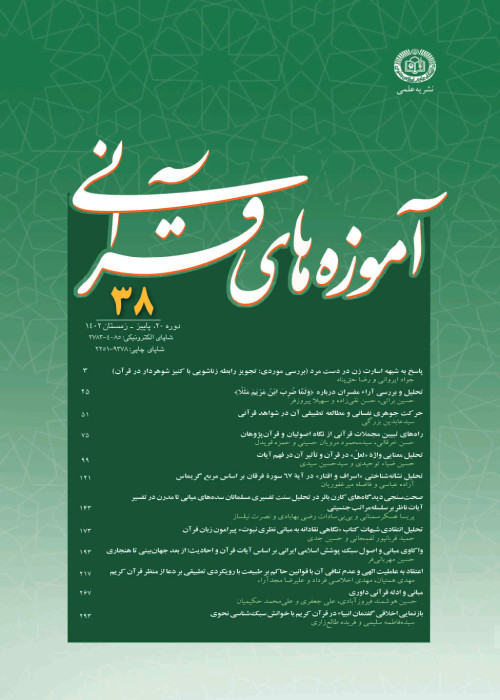Semiotic Analysis of “Extravagant and Niggardly” in Verse 67 of Sūrah al-Furqān (Arabic: سوره الفرقان) Based on Greimas Square
Many attempts have been made to understand the divine verses since the early days of the revelation of the Noble Quran. The correct understanding of the verses is directly related to how to understand the meaning of the verses and therefore, one of the important challenges in tafsīr (Arabic: تفسیر, Quranic exegesis) of the Noble Quran is the accurate identification of the inter-lexical relationships. One of the verses that mufassirūn (Arabic: مفسرون, an author of a tafsīr) disagree on is the verse 67 of Sūrah al-Furqān (Arabic: سوره الفرقان). In this verse, the words “extravagant” (Arabic: إسراف) and “niggardly” (Arabic: إقتار) are presented as a contradictory double and the word “consistency” (Arabic: قوام) is mentioned as the middle meaning (mediate) between them. The “semiotic square” pattern is one of the selected patterns and a method for deep representation of semantic structure of the text based on the contrary relationship explained by Algirdas Julien Greimas. It is an attempt in this research to gain a deeper understanding of the concepts of verse 67 of Sūrah al-Furqān by analyzing the opposing dualities of “extravagant” (Romanized: Isrāf) and “niggardly” (Romanized: Iqtār). The common category in the present article between these two concepts is considered “consumption property”. Therefore, only “property” or absence of it is not considered. The findings of this research indicate that the semantic layers of “Iqtār” are composed of words such as “Imsāk” (Arabic: إمساک, retention or abstaining) and “Baukhl” (Arabic: بخل, meaning: the quality of being miser or the state of being unwilling to spend money, avarice). Also, the word “Isrāf” includes semantic layers such as Tabdhīr (Arabic: تبذیر, meaning: act of wasting) and “Tʿaffuf” (Arabic: تعفف, meaning: the state of being virtuous). In the meantime, there are other different ranges of consumption property such as “consistency” (Arabic: قوام, qawām) and contentment (Arabic: قناعه, qanāʿat). The Noble Quran uses the word “consistency” to express the intermediate limit of these two words, which is precisely consistent with semiotic studies.
Sūrah al-Furqān , Isrāf , Iqtār , Qawām , Semiotic square
- حق عضویت دریافتی صرف حمایت از نشریات عضو و نگهداری، تکمیل و توسعه مگیران میشود.
- پرداخت حق اشتراک و دانلود مقالات اجازه بازنشر آن در سایر رسانههای چاپی و دیجیتال را به کاربر نمیدهد.


